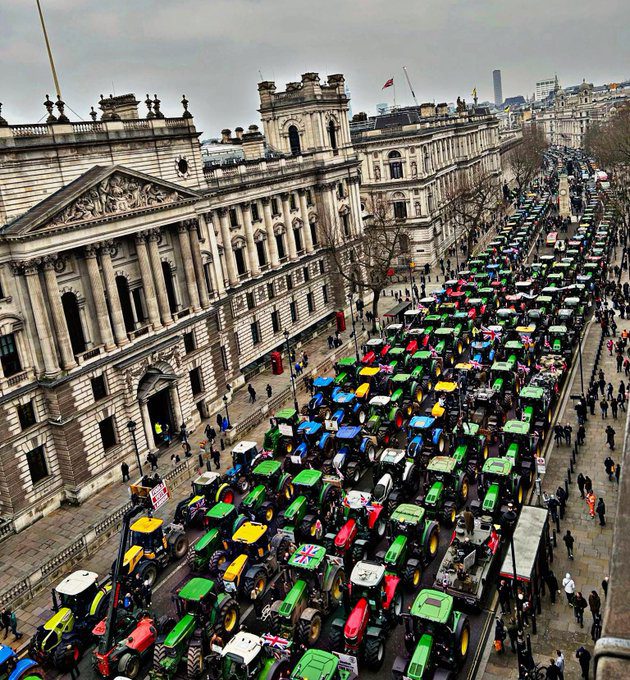Tractors rolled into the streets surrounding the Houses of Parliament in London on Monday as farmers from across Britain gathered to protest proposed changes to inheritance tax laws. The demonstration, organised by Save British Farming, was a direct challenge to the government’s plans, which analysts warn could push many farms into financial ruin.
The policy in question was introduced in the previous year’s budget by the ruling Labour Party and is scheduled to take effect in April 2026. It will see the removal of a long-standing exemption that previously allowed family farms to be transferred without incurring inheritance tax. Under the new legislation, agricultural assets exceeding £1 million ($1.24 million) will be subject to a 20% tax when passed down to heirs upon the owner’s death.
This shift is seen by many in the farming sector as a direct threat to their livelihood, as it introduces significant financial burdens that could make it difficult for family-run farms to continue operating.
“Keir Starmer came and told the farmers that we would not have any tax rises. He betrayed us. He lied to the British public.” pic.twitter.com/jKyU00kDkv
— James Melville 🚜 (@JamesMelville) February 2, 2025
The day-long tractor rally was held as British lawmakers debated an e-petition signed by nearly 151,000 people, urging the government to maintain the current tax exemptions for working farm estates. The protesters argue that preserving these exemptions is crucial for food security and the sustainability of family-run farms.
Political commentator Katie Hopkins highlighted the significance of the protest, stating that farmers were not seeking government aid or subsidies but were simply fighting to retain their land.
“They’re just asking to keep the farms they inherited from their parents so they could give them to their kids. They’re just asking to get up at five o’clock in the morning so they can feed the nation,”
she told RT.
Farmers drove their tractors into Westminster, honking their horns and carrying signs with messages such as “We all need a farmer,” “Food security first,” and “Let’s stand together.” These slogans reflect growing concerns that the new tax policy could reduce food production and harm rural communities.
Many farmers argue that their land is not an asset in the traditional sense but rather an essential tool for their work. Protester Dan Willis explained that farmland is used for growing crops and raising livestock, making it incomparable to other inherited wealth.
“We may sit amongst this massive asset, but without that asset, that’s how we earn our living,”
he said.
He further argued that taxing farmland equates to taxing the fundamental tools farmers need to produce food.
“Once you start taxing my tools, I can’t do my job, and I can’t pay any taxes.”
Willis also pointed out that the financial calculations underlying the policy changes are flawed.
“Understand the basic mathematics of how they’ve got it so far wrong; it is unsurvivable from how we can move forward as it stands today,”
he said.
Tom Bradshaw, head of the National Farmers Union, reinforced the argument that farmers are not opposed to paying taxes but believe taxation should be applied in a more sustainable manner.
“We would rather pay tax on our produce rather than a death tax, which is simply unaffordable and unacceptable,”
he stated.
This view is shared by many within the industry who fear that the inheritance tax will result in the forced sale of farmland, breaking up estates that have been managed by families for generations.
Despite mounting opposition, Prime Minister Keir Starmer has remained firm on the policy, arguing that most farmers will not be affected. In response to earlier protests in November, he defended the decision, stating:
“The overwhelming majority of farmers would be exempt from the measure.”
He further justified the move by stressing that difficult decisions were necessary to ensure the stability of the UK economy.
“The government is taking tough decisions that were necessary to stabilise our economy.”
As the April 2026 deadline approaches, the debate over inheritance tax reforms continues to intensify. Farmers argue that the policy unfairly penalises those who work the land and threatens the sustainability of British agriculture. Meanwhile, the government insists that the reforms are part of broader economic measures aimed at fiscal stability.

















